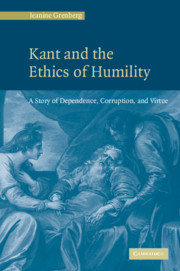Book contents
- Frontmatter
- Contents
- Acknowledgments
- Introduction
- PART I KANTIAN VIRTUE
- 1 Dependent and corrupt rational agency
- 2 Constraints on any possible Kantian account of virtue
- 3 A Kantian account of virtue
- PART II A KANTIAN RESPONSE TO RECENT ACCOUNTS OF HUMILITY
- PART III THE KANTIAN VIRTUE OF HUMILITY
- PART IV THE VIRTUES OF KANTIAN HUMILITY
- Conclusion
- References
- Index
1 - Dependent and corrupt rational agency
Published online by Cambridge University Press: 20 February 2010
- Frontmatter
- Contents
- Acknowledgments
- Introduction
- PART I KANTIAN VIRTUE
- 1 Dependent and corrupt rational agency
- 2 Constraints on any possible Kantian account of virtue
- 3 A Kantian account of virtue
- PART II A KANTIAN RESPONSE TO RECENT ACCOUNTS OF HUMILITY
- PART III THE KANTIAN VIRTUE OF HUMILITY
- PART IV THE VIRTUES OF KANTIAN HUMILITY
- Conclusion
- References
- Index
Summary
Recent accounts of humility, such as Norvin Richards', emphatically set aside any “Catholic metaphysics” that might ground the state, finding its view of human nature – one which asks us to consider ourselves as “contemptible” and “foul” – to be deeply problematic. Richards turns instead to an empirical and behavioral analysis of humility, focusing upon an individual agent's awareness of the flaws, failings, and limits specific to her to ground humility. For example, when he asks what it would mean to be “humble” about having a scholarly article accepted for publication in a prestigious journal, he says the following:
Suppose, for example, that you have just had an article accepted by a leading journal. You have never been successful there before. In fact, this is much better than you ever did earlier in your career, and as you think of your progress, you are pleased. There are other ways to look at things, though. How does your work compare to what your colleagues are doing? To the work of contemporaries at similar institutions? To that of the leading philosophers of the day? To the Nichomachean Ethics, or the Theory of Descriptions?
(Richards, 1992, 6)In order to put his accomplishments in perspective, and thus attain a proper humility, the person in this example needs to compare them against the accomplishments of others and, presumably, find his own lacking in the comparison.
- Type
- Chapter
- Information
- Kant and the Ethics of HumilityA Story of Dependence, Corruption and Virtue, pp. 15 - 48Publisher: Cambridge University PressPrint publication year: 2005



